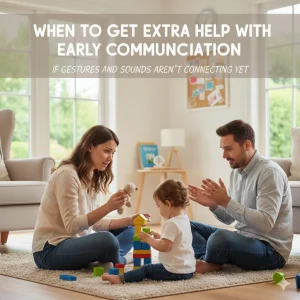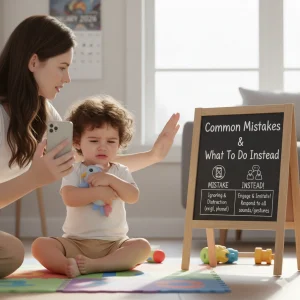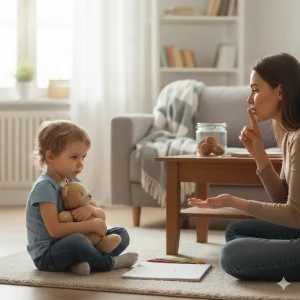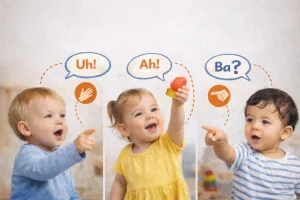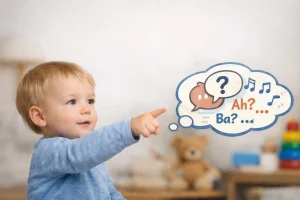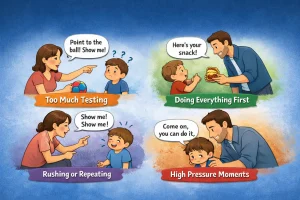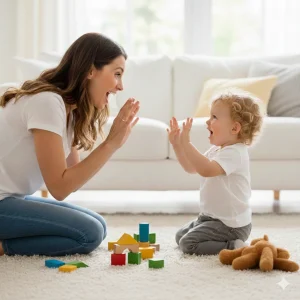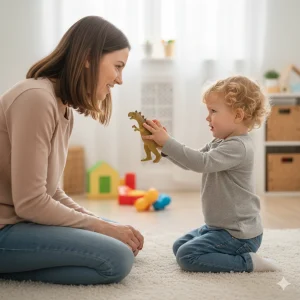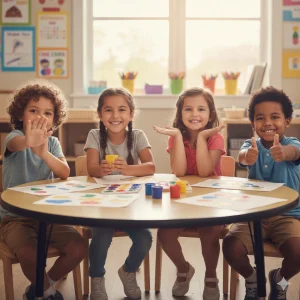When Repetition Becomes a Concern: Echolalia in Toddlers
Last Updated: September 1, 2025
“Why does my toddler keep repeating everything I say?”
If you’ve asked yourself this lately, you’re not alone. Many parents notice their toddlers echoing words or phrases—sometimes right after hearing them, sometimes hours later—and wonder whether it’s just playful mimicry or a sign of something deeper. This behavior is known as echolalia in toddlers, and while it can be a normal part of early language development, it may also signal a speech delay or another underlying issue when it persists.
While some repetitive speech is a normal part of early language development, persistent repetition, also known as echolalia, can sometimes indicate a speech delay or even be an early sign of autism spectrum disorder (ASD). Knowing the difference between typical language imitation and a potential communication delay is key to helping your child thrive.
What is Echolalia in Toddlers?
It’s common for toddlers to repeat things they hear. In fact, it’s part of how they learn to speak. But when a child repeats words or phrases exactly—sometimes over and over again—you might be seeing something called echolalia.
A Simple Definition
Echolalia is when a child echoes or repeats what they’ve heard. This can be something you just said, a line from a cartoon, or even a sentence they heard earlier in the day. It’s a form of language imitation and often shows up between 18 months and 3 years as part of early speech development.
You may hear it referred to as “mimic speech” or “parroting words”—and while that might sound cute, repeated use of echolalia beyond the toddler stage could be a sign of a deeper communication delay.
Two Types: Immediate vs. Delayed Echolalia
To better understand echolalia in toddlers, it helps to know that there are two types:
- Immediate Echolalia:
Your child repeats what they just heard—right away.
Example:
You ask, “Do you want milk?” and your toddler instantly replies, “Do you want milk?” instead of “Yes” or “No.” - Delayed Echolalia:
Your child repeats phrases or sentences hours, days, or even weeks later, often out of context.
Example:
Suddenly saying “Time for lunch!” while playing with toys—just like their daycare teacher says every day.
Both types are commonly seen in children with speech delays or autism spectrum disorder, but they may also be part of normal language exploration—especially in younger toddlers just starting to find their voice.
What It Might Look Like at Home
Parents often notice:
- Their toddler repeating a question instead of answering it.
- Copying phrases from YouTube videos or rhymes—even when unrelated to the situation.
- Repeating entire conversations or directions in a sing-song tone.
While this might seem harmless at first, frequent echolalia with little to no spontaneous language (like your child coming up with their own sentences) could signal the need for speech therapy or a language evaluation.
Is Echolalia Normal in Toddler Speech Development?
If you’ve ever asked, “Is it normal for a toddler to repeat everything I say?”, the short answer is — sometimes, yes. Repetition is actually a typical part of early language development, especially during the toddler years when children are just beginning to figure out how speech works.
But like many things in development, it’s all about timing, context, and progress.
Understanding Typical vs. Atypical Language Repetition
Toddlers often learn to talk by imitating what they hear — from parents, cartoons, songs, or even random conversations around them. This kind of mimic speech or repetitive language helps them build vocabulary and speech patterns.
This type of typical repetition is:
- Brief and fades over time
- Often accompanied by gestures or attempts to communicate meaning
- Followed by growing use of original words and phrases
However, atypical language repetition (like echolalia) might:
- Continue past age 3 without much spontaneous language
- Happen without any clear understanding of what’s being said
- Replace functional conversation with scripted or robotic speech
In other words, it’s not just that your toddler repeats things—it’s how, why, and for how long they repeat them that matters.
Developmental Milestones: When to Expect What
Here’s a quick timeline of normal speech development milestones and when repetition might become a concern:
- 12–18 months:
Repeating single words like “ball,” “mama” — very normal. Children should also begin using a few simple words on their own. - 18–24 months:
Repeating short phrases and starting to combine 2 words, like “want milk” or “go park.” Imitation is still part of learning. - 24–36 months:
Toddlers should start using their own phrases and asking questions. If repetition (especially delayed repetition) is still the main form of communication, it may be worth noting. - After 3 years:
Most children begin using language more independently. If your child is still heavily relying on repetitive speech, repeating TV scripts, or echoing your words without clear understanding, this may signal a language delay or communication difficulty.
Repetitive Language vs. Functional Communication
It’s important to know the difference between these two:
- Repetitive Language:
Saying things over and over again — either immediately or delayed — without truly using them to express thoughts or needs. - Functional Communication:
Using words, gestures, or signs to communicate a want, need, idea, or emotion. For example, “I’m hungry,” “Want toy,” or pointing to water.
If your toddler’s speech mostly consists of parroting words and not much independent communication, it’s a good idea to talk to a speech-language pathologist.
When Repetition Becomes a Concern: Red Flags to Watch For
Many toddlers go through a phase where they love to echo everything they hear. It’s cute, sometimes funny, and often feels like progress. But as your child grows, you might begin to wonder — when does echolalia become a concern?
While some repetitive language is completely normal during early speech development, certain patterns may point to a language delay or even early signs of autism spectrum disorder (ASD). Understanding the difference between harmless repetition and potential toddler communication red flags can help you decide if it’s time to seek help.
How to Know When Repetition Is More Than Just Imitation
Here are a few signs that echolalia in toddlers may need closer attention:
- Repetition is the main way your child communicates.
If your toddler mostly repeats what others say without using their own words or phrases, it could be a sign of limited functional communication. - They repeat things without understanding them.
For example, your child says “Do you want juice?” instead of answering “yes” or “no” when asked. This kind of immediate echolalia might indicate trouble with processing or expressing language. - Phrases are repeated out of context.
If your child suddenly says a phrase from a cartoon during dinner, or repeats a line from days ago while playing, that may be delayed echolalia. It’s often seen in children with autism. - They struggle with back-and-forth interaction.
Healthy communication involves taking turns, making eye contact, and responding appropriately. Children with language delay may not use gestures, show interest in others’ speech, or attempt their own questions or comments.
Other Toddler Communication Red Flags
Watch for these signs alongside echolalia:
- Limited vocabulary or very few words by age 2
- No two-word combinations by 2.5 years
- Not pointing or gesturing to show interest
- Not responding to name being called
- Frustration when trying to communicate
- Lack of pretend play or social interaction
These signs often show up with delayed speech milestones and could indicate that your toddler may benefit from an evaluation by a speech-language pathologist.
Why Early Recognition Matters
When echolalia is linked to language delay in toddlers or autism, early identification is key. Children’s brains are highly adaptable in the early years, and speech therapy or early intervention programs can make a big difference in helping them build real, meaningful communication skills.
Remember, you don’t need to wait for a diagnosis to seek support. If you feel that something is “off” or your child is struggling to express themselves beyond repetition, trust your instincts and reach out to a professional.
Echolalia and Autism: What’s the Link?
One of the most common concerns parents have after noticing their child repeating words or phrases is:
“Does this mean my child has autism?”
It’s an important question—and the answer isn’t always simple. While there is a connection between autism and echolalia, it’s equally important to know that not all echolalia means autism.
What Is the Connection Between Autism and Echolalia?
Echolalia—especially delayed echolalia or scripting—is often seen in children with autism spectrum disorder (ASD). Scripting refers to when a child repeats lines from movies, songs, or conversations, often in the same tone or rhythm they originally heard. For example, your child might say, “Let’s go on an adventure!” while walking into the kitchen, even though it doesn’t match the moment.
In children with autism, scripting is often a way to:
- Self-soothe or regulate emotions
- Express needs when spontaneous language is difficult
- Fill in social interactions that feel unpredictable
However, echolalia alone is not enough to diagnose autism. It needs to be viewed in the broader context of your child’s social, emotional, and communication development.
Key Differences in Social Communication
Children with autism often show more than just repetitive speech. They may struggle with the social use of language, known as pragmatic communication. This includes:
- Trouble with back-and-forth conversation
- Limited eye contact
- Difficulty using gestures (like pointing or waving)
- Unusual tone or rhythm when speaking
- Challenges with pretend play or shared attention
That’s why echolalia—when paired with other early signs of autism in toddlers—can become a more meaningful clue.
Quick Checklist: When to Explore an Autism Evaluation
If your toddler:
- Speaks mostly by repeating things without adding their own thoughts
- Uses lines from shows or songs in everyday speech (scripting)
- Struggles to engage with others (e.g., avoiding eye contact, not pointing)
- Doesn’t respond to their name by 12–18 months
- Shows limited interest in playing with other children
- Has unusual reactions to sounds, textures, or routines
…it may be time to consult a developmental pediatrician or a speech-language pathologist. Early support makes a big difference.
Echolalia Doesn’t Always Equal Autism
Some children use echolalia as a natural stepping stone in language development. Others may have a language delay or speech processing difficulty without having autism at all. What matters most is how your child is progressing over time—and whether they are starting to build functional, independent communication.
When to Seek Help: Does My Child Need Speech Therapy?
If you’ve been noticing your toddler repeating phrases more than using their own words, it’s only natural to ask yourself:
“Is this just a phase… or does my child need help?”
The good news is, you’re not alone—and asking this question is the first step toward getting the support your child might need. Many children go through periods of repetitive speech, but when it begins to affect communication and social interaction, it may be time to explore speech therapy for toddlers.
Signs My Toddler May Need Speech Therapy
Here are some common signs that may indicate your child could benefit from a professional evaluation:
- Speaks mostly by repeating what others say, with little original language
- Rarely uses words to request things or express needs
- Shows delayed speech milestones (e.g., not saying words by 18 months, or phrases by age 2)
- Has difficulty following simple directions or responding to their name
- Avoids eye contact or struggles with turn-taking in communication
- Gets frustrated when trying to talk or communicate
These signs don’t mean something is “wrong” with your child—but they do suggest it’s worth checking in with a professional.
How Speech Therapists Help Toddlers with Echolalia
A speech-language pathologist (SLP) is trained to understand how children develop communication skills and what to do when those skills don’t follow the typical path. During an assessment, the therapist will:
- Observe your child’s speech patterns and behavior
- Identify whether the echolalia is part of typical development or linked to a language delay
- Assess your child’s receptive language (understanding words) and expressive language (using words)
- Determine how well your child uses speech to interact with others
If support is needed, the SLP will create a personalized therapy plan to help your child move from repetitive speech to functional communication—like asking questions, expressing emotions, and starting conversations.
Therapy often includes:
- Play-based techniques to build language skills naturally
- Modeling simple, useful phrases
- Visual cues and repetition with purpose
- Support for parents to practice communication strategies at home
The Power of Early Intervention
The earlier you seek help, the better the outcomes. Young children’s brains are highly adaptable, and with timely support, many go on to develop strong communication skills. Whether your child is eventually diagnosed with a speech delay, autism, or simply needs a little boost, early intervention can make a lifelong difference.
If you’re unsure, start by tracking your child’s language development milestones, and don’t hesitate to reach out to a speech therapist for guidance. A simple evaluation can give you clarity—and peace of mind.
How to Support a Toddler with Echolalia at Home
If you’ve been wondering how to help a toddler with echolalia, the good news is—there’s a lot you can do right at home. While professional support like speech therapy for toddlers is important, small everyday changes in how you interact with your child can also make a big difference.
Many children with echolalia are trying their best to communicate. They may just need a little extra help learning how to move from repeating language to using it meaningfully. Let’s look at a few practical, parent-friendly strategies that support this transition.
1. Model the Language You Want Them to Use
Children with echolalia often repeat exactly what they hear. That’s why it’s so powerful to be intentional with your words. Speak slowly, clearly, and use short, functional phrases your toddler can copy.
Instead of saying: “Do you want to play with the red ball or the blue ball today?”
Try: “Want ball?” or “Throw ball.”
These shorter models are easier to imitate—and eventually, to understand and use independently.
2. Simplify Speech Without Oversimplifying
Stick to simple, meaningful phrases, especially during everyday routines like eating, bathing, or dressing. Repetition is good—but aim for useful, real-life language, not just repeating what your child says.
For example, if your child says, “Brush teeth!” from a cartoon, you can say:
“Yes! Let’s brush your teeth now. You hold the brush, I help.”
This connects scripting to real-world action and builds pragmatic language skills (the social use of language).
3. Use Visual Aids and Gestures
Children with echolalia often benefit from visual supports. These can help bridge the gap between understanding and expression, especially for those with weaker receptive language (how they process what others say).
Try:
- Picture cards for daily routines
- Gesture-based prompts (e.g., pointing to cup and saying “drink”)
- Simple visual schedules (e.g., first snack, then play)
These tools make language more concrete, helping your child grasp meaning and begin using words more purposefully.
4. Make Language Fun with Play-Based Strategies
Play-based speech therapy is a powerful approach for children with echolalia. And the best part? You can bring it home.
During play:
- Narrate what’s happening: “Car goes fast!” or “Teddy is sleeping.”
- Use pretend play to build back-and-forth interaction.
- Repeat the same words consistently so your child starts using them too.
Playing face-to-face, at their level, encourages connection and functional communication in a natural way.
5. Focus on Progress, Not Perfection
Your child may continue to use some echolalia as they learn. That’s okay! The goal is to support gradual progress toward independent, expressive language. Celebrate small wins—like when your child asks for something using just one new word.
Key Tip:
Always pay attention to what your child is trying to say, even if it comes out in a repeated or unusual way. Their communication may be limited—but their intentions are real. Meeting them halfway builds confidence and connection.
Digital Tools and Resources That Can Help
In today’s world, you don’t have to wait for a clinic appointment or specialist visit to start helping your child. With the right digital support, parents can take meaningful action from the comfort of home. Whether you’re navigating echolalia, speech delays, or early signs of autism, there are tools designed to guide you every step of the way.
Why Digital Support Matters
Early language development happens best through consistent practice and responsive interaction. But many parents feel unsure where to begin—or how to make speech-building activities fun and effective. That’s where digital tools for speech development can be a game-changer.
BASICS App – Your At-Home Speech and Autism Support Partner
One of the top-rated tools in India, the BASICS App is a parent-friendly platform created by speech and developmental experts. It’s designed specifically for toddlers showing signs of speech delay, echolalia, or autism.
With the BASICS App, you get:
- Structured activities tailored to your child’s age and skill level
- Guided speech therapy exercises you can do at home
- Printable resources for hands-on learning
- Progress tracking to monitor your child’s growth
- Multilingual and culturally appropriate content
- Activities focusing on functional communication, not just vocabulary building
Whether your child is just starting to speak or repeating everything you say, BASICS gives you step-by-step support rooted in real therapy techniques.
More Benefits of Digital Tools Like BASICS
- Daily practice without screen overload
- Built-in parent coaching and explanations
- Content aligned with early intervention goals
- Flexible enough to fit into your routine—morning, evening, or weekend
These features make it one of the best speech delay apps and autism apps for toddlers available today.
Next Steps: Take Action Today
If you’re concerned about your child’s speech or noticing repetitive language, don’t wait. The earlier you start, the more progress you can see.
Explore the BASICS App for guided, therapist-backed activities
Download free printable resources for speech and language practice
You don’t need to do this alone—digital tools can help you become your child’s best communication partner.
Conclusion:
If your toddler repeats words often, don’t panic. Some echolalia in toddlers is part of learning to speak. But if the repetition continues without progress, it could be a sign of a speech delay in toddlers. Watch how your child uses words—are they trying to express themselves? Are they improving?
Keep talking, playing, and tracking their milestones. If you’re unsure, speak to a professional. Speech therapy for toddlers can make a big difference. You’re not alone, and support is available. Remember, every little word matters—and your support helps your child find their voice.
Frequently Asked Questions:
1. What is echolalia in toddlers?
Echolalia is when a toddler repeats words or phrases they’ve heard, either right away or after some time. It’s a natural part of early speech for many children. But if repetition becomes the only way they speak, it may signal a speech delay or autism.
2. Is it normal for a toddler to repeat everything you say?
Yes, it’s common for toddlers to repeat what you say as they learn to talk. This is part of language development. But if they keep repeating without understanding or using their own words, it may need attention.
3. When does echolalia become a concern?
Echolalia becomes a concern when it continues past age 3 or replaces meaningful conversation. If your toddler echoes words instead of expressing their own needs or thoughts, it may point to a communication delay. This is when a speech evaluation is helpful.
4. Can echolalia be a sign of autism?
Echolalia can be one of the early signs of autism, especially if it’s delayed or used out of context. Many autistic children repeat lines from shows or conversations. But echolalia alone is not enough for a diagnosis—other social and communication signs matter too.
5. How is echolalia different from normal speech repetition?
Normal speech repetition is part of learning—toddlers repeat to practice and learn new words. Echolalia, on the other hand, is often out of place or used without understanding. It may sound robotic or copied and may continue beyond the typical learning stage.
6. What are early signs that my toddler may need speech therapy?
If your toddler mostly repeats words, avoids eye contact, struggles to use gestures, or shows little progress with talking, these may be red flags. Missing speech milestones is another sign. A speech therapist can help assess what’s typical and what needs support.
7. Can speech therapy help toddlers with echolalia?
Yes, speech therapy is very effective for toddlers with echolalia. Therapists teach children to use language to communicate, not just repeat. They also help build understanding, social interaction, and meaningful speech through fun, play-based methods.
8. What can I do at home to help my toddler with echolalia?
Start by modeling simple, clear phrases during daily routines. Use visual aids, gestures, and short sentences to help your child understand and copy real communication. The goal is to shift from repetition to functional language over time.
9. Are there apps that help toddlers with speech delay or echolalia?
Yes! Apps like the BASICS App are designed for toddlers with speech delays, autism, or echolalia. These apps offer structured speech activities, visuals, and therapist-approved strategies that parents can use every day at home.
10. Should I wait or get my toddler evaluated now?
If you’re unsure about your child’s speech, it’s always better to check early. Early intervention helps toddlers make faster progress. A simple visit to a speech therapist can bring clarity and set your child on the right path.
About the Author:
Anuradha Karanam
Speech-language pathologist (7+ years of experience)
Anuradha Karanam is a skilled speech-language pathologist with over 6 years of experience. Fluent in Tamil, Telugu, Hindi, and English, she specializes in parent counseling, speech sound disorders, fluency assessment, and speech-language evaluations. Anuradha excels at working with children with developmental disorders, offering creative and effective therapy programs. Currently, at Wellness Hub, she holds a BASLP degree and is registered with the RCI (CRR No A85500). Her patience, ambition, and dedication make her a trusted expert in her field.
Book your Free Consultation Today
Parent/Caregiver Info:
Client’s Details:
* Error Message
